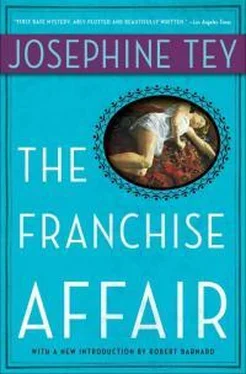Once again she gave her evidence in model fashion; her clear young voice audible to everyone in court. Once again she had her audience breathless and motionless. The only difference this time was that the Bench was not doting. The Bench, indeed, if one was to judge by the expression on the face of Mr. Justice Saye, was very far from doting. And Robert wondered how much the judge’s critical gaze was due to natural distaste for the subject, and how much to the conclusion that Kevin Macdermott would not be sitting there ready to defend the two women in the dock unless they had a thundering good defence.
The girl’s own account of her sufferings did what her counsel’s had not done: roused the audience to an emotional reaction. More than once they had given vent to a united sigh, a murmur of indignation; never overt enough to rank as a demonstration, and so bring down the Court’s rebuke, but audible enough to show which way their sympathies lay. So that it was in a charged atmosphere that Kevin rose to cross-examine.
“Miss Kane,” began Kevin in his gentlest drawl, “you say that it was dark when you arrived at The Franchise. Was it really so dark?”
This question, with its coaxing tone, made her think that he did not want it to be dark, and she reacted as he intended.
“Yes. Quite dark,” she said.
“Too dark to see the outside of the house?”
“Yes, much too dark.”
He appeared to give that up and try a new tack.
“Then the night you escaped. Perhaps that was not quite dark?”
“Oh, yes. That was even darker, if possible.”
“So that you could not possibly have seen the outside of the house on some occasion?”
“Never.”
“Never. Well, having settled that point, let us consider what you say you could see from the window of your prison in the attic. You said in your statement to the police, when you were describing this unknown place where you were imprisoned, that the carriage-way from the gate to the door ‘went straight for a little and then divided in two into a circle up to the door.’”
“Yes.”
“How did you know it did that?”
“How did I know it? I could see it.”
“From where?”
“From the window in the attic. It looked out on the courtyard in front of the house.”
“But from the window in the attic it is possible to see only the straight part of the carriage-way. The edge of the roof cuts off the rest. How did you know that the carriageway divided in two and made a circle up to the door?”
“I saw it!”
“How?”
“From that window.”
“You want us to understand that you see on a different principle from ordinary beings? On the principle of the Irishman’s gun that shoots round corners. Or is it all done by mirrors?”
“It is the way I described!”
“Certainly it is the way you described; but what you described was the view of the courtyard as seen by, let us say, someone looking over the wall at it; not by someone looking at it from the window in the attic. Which you assure us was your only view of it.”
“I take it,” said the Court, “that you have a witness to the extent of the view from the window.”
“Two, my lord.”
“One with normal vision will be sufficient,” said the Court dryly.
“So you cannot explain how, speaking to the police that day in Aylesbury, you described a peculiarity that you could not possibly have known about, if your story was true. Have you ever been abroad, Miss Kane?”
“Abroad?” she said surprised by the change of subject. “No.”
“Never?”
“No, never.”
“You have not, for instance, been to Denmark lately? To Copenhagen, for instance.”
“No.” There was no change in her expression but Robert thought that there was the faintest uncertainty in her voice.
“Do you know a man called Bernard Chadwick?”
She was suddenly wary. Robert was reminded of the subtle change in an animal that has been relaxed and becomes attentive. There is no alteration in pose; no actual physical change. On the contrary, there is only an added stillness; an awareness.
“No.” The tone was colourless; uninterested.
“He is not a friend of yours.”
“No.”
“You did not for instance, stay with him at a hotel in Copenhagen?”
“No.”
“Have you stayed with anyone in Copenhagen?”
“No, I have never been abroad at all.”
“So that if I were to suggest that you spent those missing weeks in a hotel in Copenhagen, and not in an attic at The Franchise, I should be mistaken.”
“Quite mistaken.”
“Thank you.”
Miles Allison, as Kevin had anticipated, rose to retrieve the situation.
“Miss Kane,” he said, “you arrived at The Franchise by car.”
“Yes.”
“And that car, you say in your statement, was driven up to the door of the house. Now, if it was dark, as you say, there must have been side-lights on the car, if not headlights; which would illuminate not only the carriage-way but most of the courtyard.”
“Yes,” she broke in, before he could put it to her, “yes, of course I must have seen the circle then. I knew I had seen it. I knew it.” She glanced at Kevin for a moment, and Robert was reminded of her face when she saw that she had guessed correctly about the suitcases in the cupboard, that first day at The Franchise. If she knew what Kevin had waiting for her, Robert thought, she would have no spare thought for a passing triumph.
She was succeeded in the witness-box by Carley’s “oleograph”; who had bought both a new frock and a new hat for her appearance at Norton – a tomato-red frock and a puce hat with a cobalt ribbon and a pink rose – and looked more luscious and more revolting than ever. Again Robert was interested to note how her relish of her part discounted, even with this more emotional audience, the effect of what she said. They didn’t like her, and in spite of their parti pris attitude their English distrust of malice cooled their minds towards her. When Kevin, cross-examining, suggested that she had in fact been dismissed and had not “given in her notice” at all, there was a So-that’s-it! expression on every second face in court. Apart from an attempt to shake her credit, there was not much that Kevin could do with her, and he let her go. He was waiting for her poor stooge.
The stooge, when she arrived, looked even less happy than she had looked in the police court at Milford. The much more impressive array of robes and wigs clearly shook her. Police uniforms were bad enough, but in retrospect they seemed positively home-like compared with this solemn atmosphere, this ritual. If she was out of her depth in Milford, she was obviously drowning here. Robert saw Kevin’s considering eye on her, analysing and understanding; deciding on his approach. She had been scared stiff by Miles Allison, in spite of his patient quietness; evidently regarding anything in a wig and gown as hostile and a potential dispenser of penalties. So Kevin became her wooer and protector.
It was positively indecent, the caress that Kevin could get into his voice, Robert thought, listening to his first sentences to her. The soft unhurried syllables reassured her. She listened for a moment and then began to relax. Robert saw the small skinny hands that had been clutched so tightly together on the rail of the box slacken and spread slowly to a prone position. He was asking about her school. The fright had faded from her eyes and she was answering quite calmly. Here, she quite obviously felt, was a friend.
“Now, Gladys, I am going to suggest to you that you did not want to come here today and give evidence against these two people at The Franchise.”
“No, I didn’t. Indeed I didn’t!”
Читать дальше
Конец ознакомительного отрывка
Купить книгу












